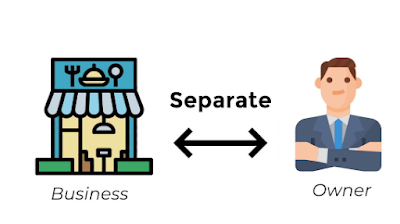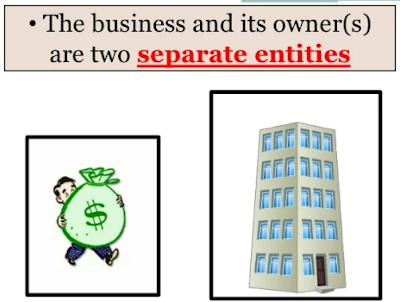Business Entity Concept
In accounting business entity concept implies that business is distinct and separate from its owners i.e., business and its activities are independent of its owner and their respective activities.
Business entity concept is also called separate entity concept, separate economic entity concept.
It have following implications:
- Income and expenses of business are separate from income and expenses of its owner
- Transactions related to business activities must be recorded separately.
- Decisions dealings of owners in their personal capacity has no burden on business and same applies for business.
- Agreements and contracts of owners in their personal capacity are not agreements and contracts of business.
- If a single transaction for both Assets and liabilities of business are separate from assets and liabilities of its owner
- business and owner are carried out, the effect should be divided between business and owner using appropriate basis and only relevant share should be recorded in business’ books of accounts.
- Irrespective of entity’s type i.e., sole proprietorship, partnership or company, business entity concept is upheld and applied similarly i.e. business transactions are separate from its owner’s activities.
Example:
1. Mr. P owns two sole trader entities Popdew and Pepperseed. Mr P’s pay for his children education out of Popdew bank account whereas expenses for recent vacations was paid out of Pepperseed credit card.
Accounting treatment:
Payment by Popdew is non-business expenditures therefore considered drawing of capital by Mr. P. and should be deducted from equity in Popdew’s financial statement.
As credit card is funded by Pepperseed and is used to pay non-business expense, again it is considered withdrawal of capital by Mr. P and treated as reduction in equity in Pepper seed’s accounting books
Accounting treatment:
Payment by Popdew is non-business expenditures therefore considered drawing of capital by Mr. P. and should be deducted from equity in Popdew’s financial statement.
As credit card is funded by Pepperseed and is used to pay non-business expense, again it is considered withdrawal of capital by Mr. P and treated as reduction in equity in Pepper seed’s accounting books
2. Mr. P has lent 10,000 at 5% interest rate to Popdew. However, repayments to Mr. P are only for principal amounts and interest portion is not paid.
Accounting treatment:
Money lent will be recorded as Popdew’s liability and not as capital. Interest charged will be recorded as business expense and added to capital/equity of the business as interest amount is not paid/withdrawn.
Accounting treatment:
Money lent will be recorded as Popdew’s liability and not as capital. Interest charged will be recorded as business expense and added to capital/equity of the business as interest amount is not paid/withdrawn.
Conclusion
It helps in ascertaining the value of the assets and liabilities of a business in the event of any legal action taken against the business.
Author: Nazia Tabassum


No comments:
Write commentsPlease do not enter spam links